- Best SellerHot

 Select options This product has multiple variants. The options may be chosen on the product page
Select options This product has multiple variants. The options may be chosen on the product page - Tea Type
- Tea Ware
- Tea Pet & Garniture
- Mood & Health
- Gift Set
- Shop All


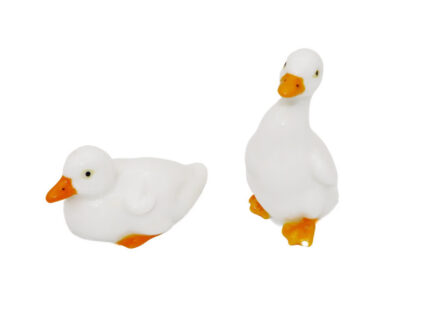

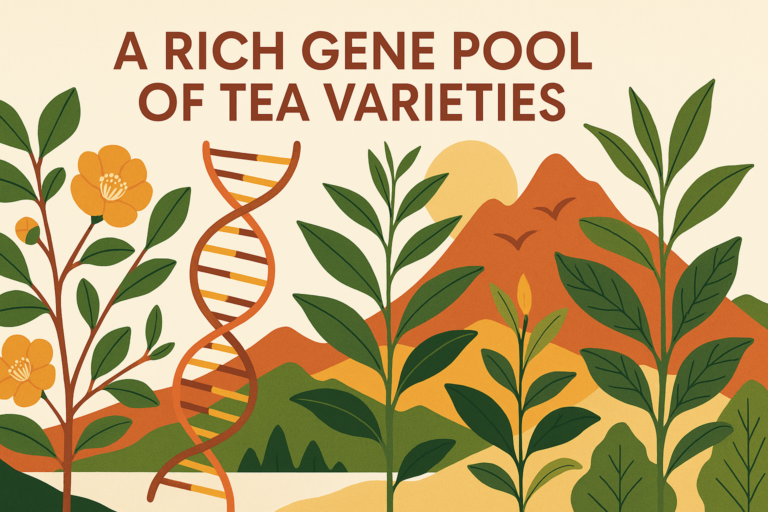




Something exciting is brewing!
Stay tuned for upcoming deals, and subscribe to be the first to know about exclusive offers on tea and teaware.

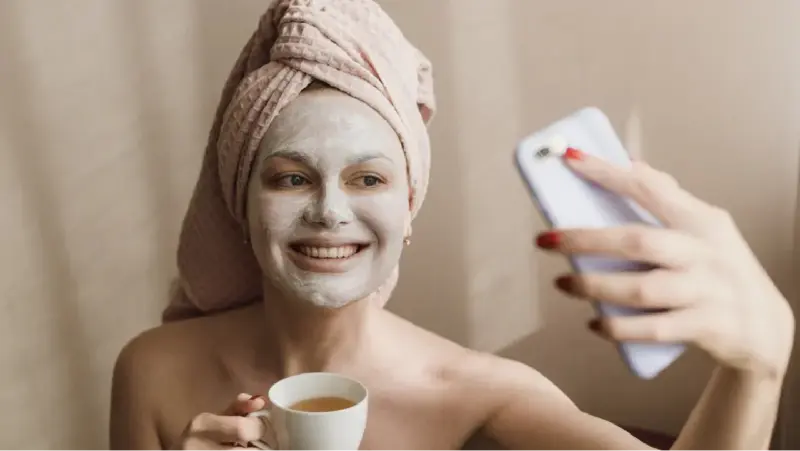
Image Source: pexels
You want your skin to look good as you get older. Tea can help you with this. The antioxidants in tea, like catechins and polyphenols, protect your skin from harm. Green tea is special. It has the most antioxidants of all popular drinks.
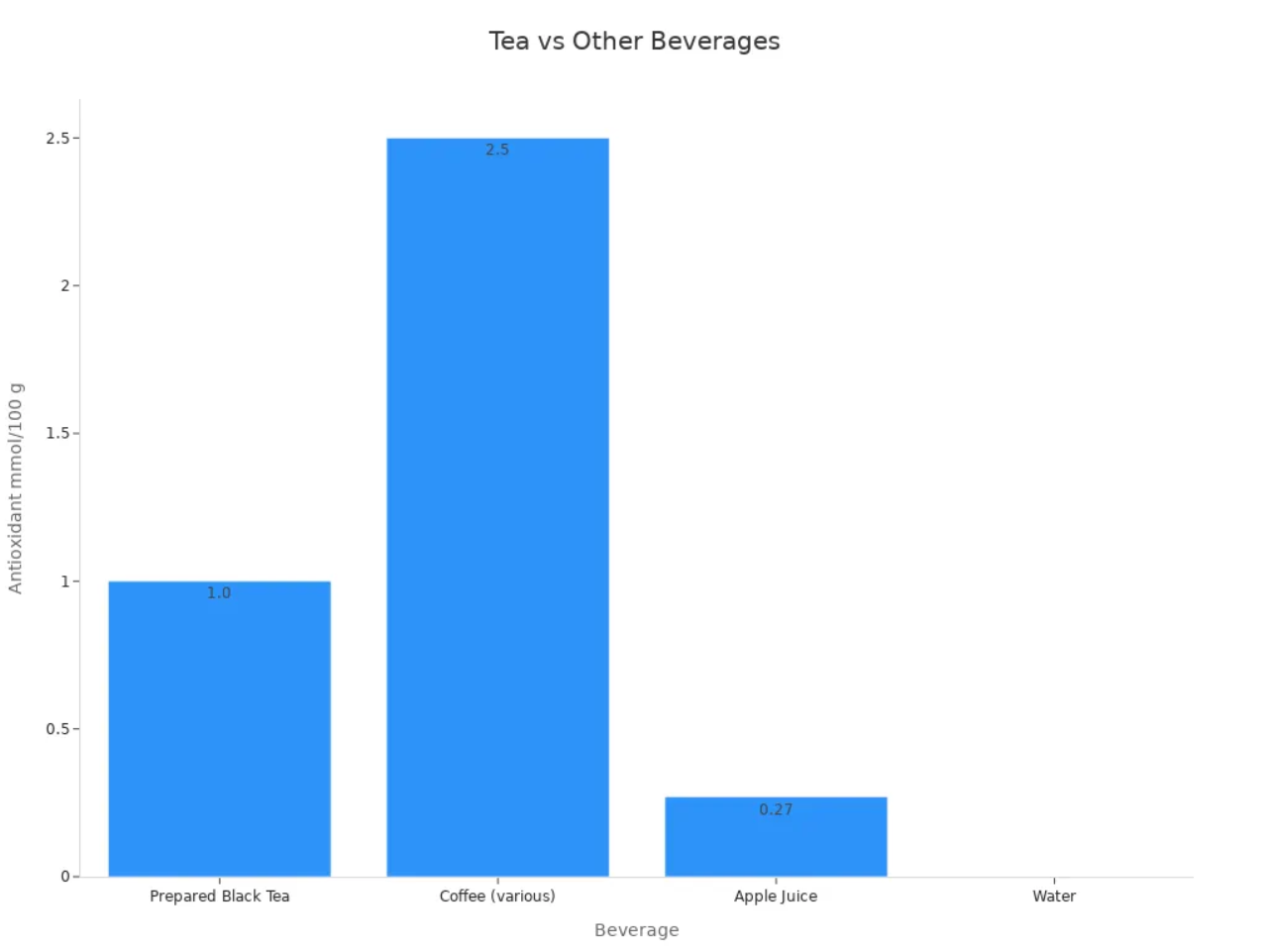
These strong compounds help fight signs of ageing. Tea is an easy way to help your Health Benefits every day.

Image Source: pexels
Drinking tea gives your body strong antioxidants. The main ones are catechins, polyphenols, EGCG, and tannins. These work together to keep your cells safe from harm. Green tea has the most catechins, especially EGCG. EGCG makes up more than half of green tea’s catechins. Scientists use special tools like high performance liquid chromatography to check these in tea. Green tea has the most catechins. Black and oolong teas have less because of how they are made. Where tea grows and how it is made can change the amount of antioxidants.
Here’s a quick look at how these compounds compare across different teas:
Parameter | Description | Quantitative Evidence |
|---|---|---|
Catechin and Polyphenol Correlation | Catechins and polyphenols are closely linked in 20 tea samples | R² = 0.96 |
Catechin Content in Tea Types | Green tea has the most EGCG. Fermentation lowers EGCG. | EGCG in green tea: 5.25–14.39% ; EGCG in dark tea: 0.36–0.93% |
ORAC Values (Antioxidant Capacity) | Green tea has the highest antioxidant power | Range: 909.28 to 3092.51 μmol TE/g |
DPPH Radical-Scavenging Activity | EGCG is best at fighting free radicals | EGCG: R² = 0.86 (P < 0.01) |
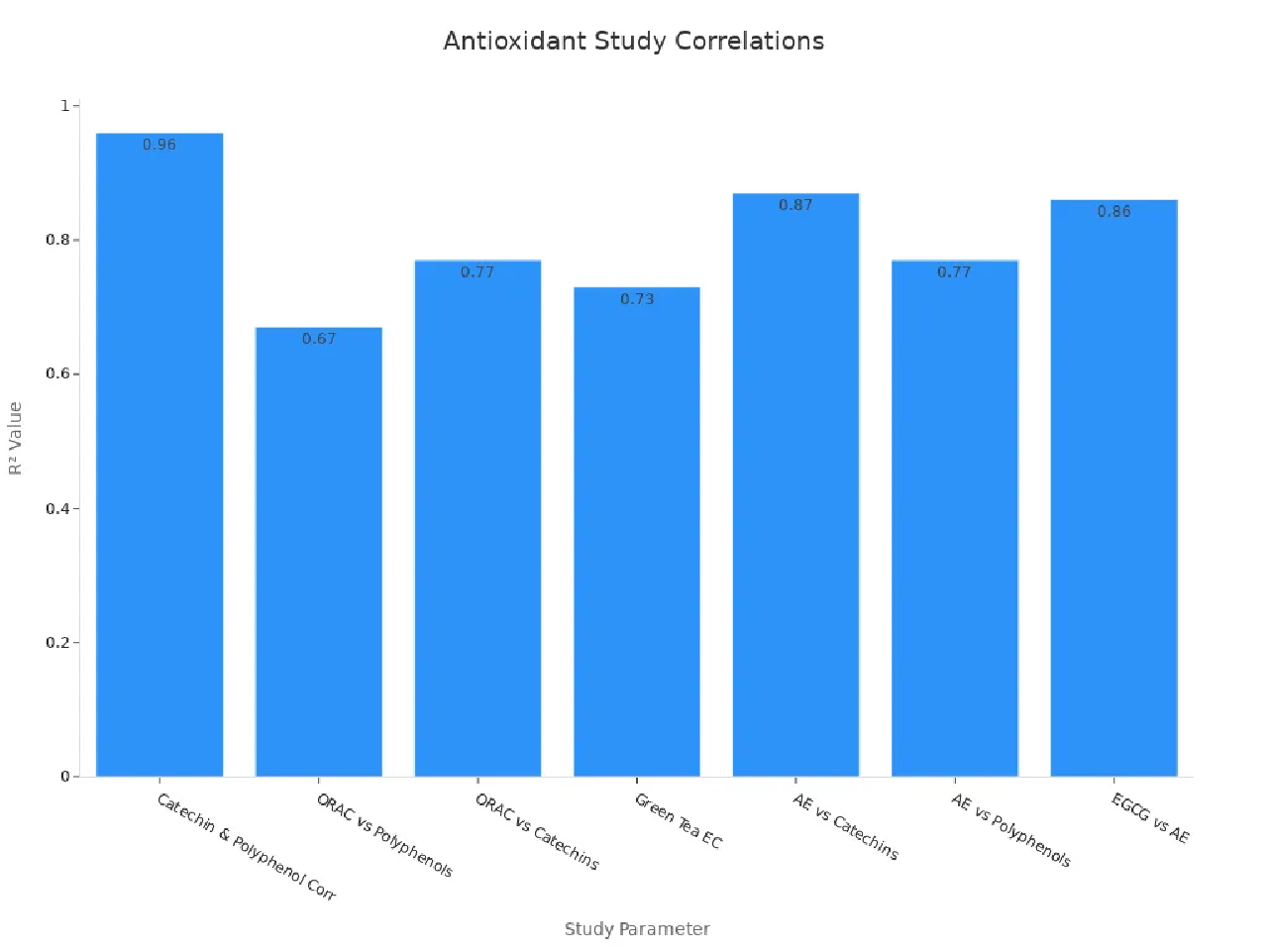
You might wonder what antioxidants do in your body. Every day, your skin and cells face free radicals. Free radicals are unstable molecules. They come from pollution, sunlight, and your own body. If too many build up, they can hurt your skin and make you age faster.
Antioxidants in tea act like shields. They find free radicals and stop them from causing harm. EGCG and other catechins are very good at this. They help your skin stay strong and healthy. They lower the stress that free radicals cause. Studies show that more catechins and polyphenols mean better protection. Green tea, with lots of EGCG, gives the strongest help
Drinking tea every day does more than warm you up. It helps your skin and body. The antioxidants in tea lower the risk of cell damage. They help your skin fix itself. Research shows green tea polyphenols protect your skin from UV rays and pollution. They can help treat skin problems like acne and psoriasis. This is because they calm the skin and fight germs.
People who drink tea often have healthier skin. Clinical trials found women who took green tea extracts for two years had smoother skin and less redness.
Other studies showed drinking or using green tea on your skin can help with sunburn, wrinkles, and dark spots. It also keeps your skin moist and stretchy.
Tip: For the best results, drink green tea often. It has the most antioxidants and is best for your skin.
Tea’s Health Benefits are not just for your skin. These antioxidants also help your heart, brain, and immune system. By choosing tea, you make a simple choice to help you age well and feel good every day.

Image Source: pexels
You face free radicals every day. These unstable molecules attack your skin cells. Sunlight, pollution, and even stress can create more free radicals. When they build up, your skin starts to show signs of ageing. You might notice wrinkles, fine lines, or dark spots. Free radicals break down collagen and elastin, which keep your skin firm and smooth.
Tea steps in as your skin’s defender. The antioxidants in tea, like EGCG and polyphenols, hunt down free radicals. They stop these molecules from causing damage. When you drink tea, you give your skin a shield against daily harm. This is one of the main Health Benefits you get from making tea part of your routine.
You want to keep your skin looking young for as long as possible. Tea can help you do that. The antioxidants in tea do more than just fight free radicals. They also protect your skin from UV rays, which are a big cause of ageing. UV rays can make your skin rough, dry, and wrinkled.
Let’s look at what studies have found about tea and skin ageing:
Study Type | Description | Key Results | Statistical Proof |
|---|---|---|---|
Randomised Clinical Trial | Green tea-based product used on skin and taken by mouth | 70% of people saw fewer wrinkles after 12 months, compared to 33% with a placebo | P = 0.026 |
Meta-Analysis | Green tea catechin supplements | Statistically significant | |
Animal Study | Green tea catechins in mice exposed to UVB | Better skin elasticity and less damage | Clear improvements seen |
You can see that tea’s Health Benefits go beyond just feeling refreshed. These studies show that tea can help slow down the signs of ageing, like wrinkles and sun spots. The results look promising, but scientists say we need more big studies to be sure. Still, adding tea to your day is a simple step you can take for your skin.
Note: Using tea both as a drink and in skincare products may give you the best results for fighting signs of ageing.
Your skin repairs itself all the time. Tea helps this process. The polyphenols in green tea, especially EGCG, lower stress in your skin cells. They help fix damage caused by pollution and sunlight. In lab studies, green tea extracts helped skin cells recover and grow stronger. They also protected skin fats from breaking down, which keeps your skin barrier healthy.
Here are some ways tea supports skin repair and hydration:
Green tea polyphenols reduce harmful molecules that damage skin proteins and DNA.
You might not notice a big change overnight, but drinking tea every day supports your skin’s natural repair. While there is not much direct proof that tea boosts hydration, keeping your skin barrier strong helps lock in moisture. This is another reason why tea’s Health Benefits matter for your skin.
Tip: Try using a green tea face mask or cream for extra support, especially if you spend a lot of time outdoors.
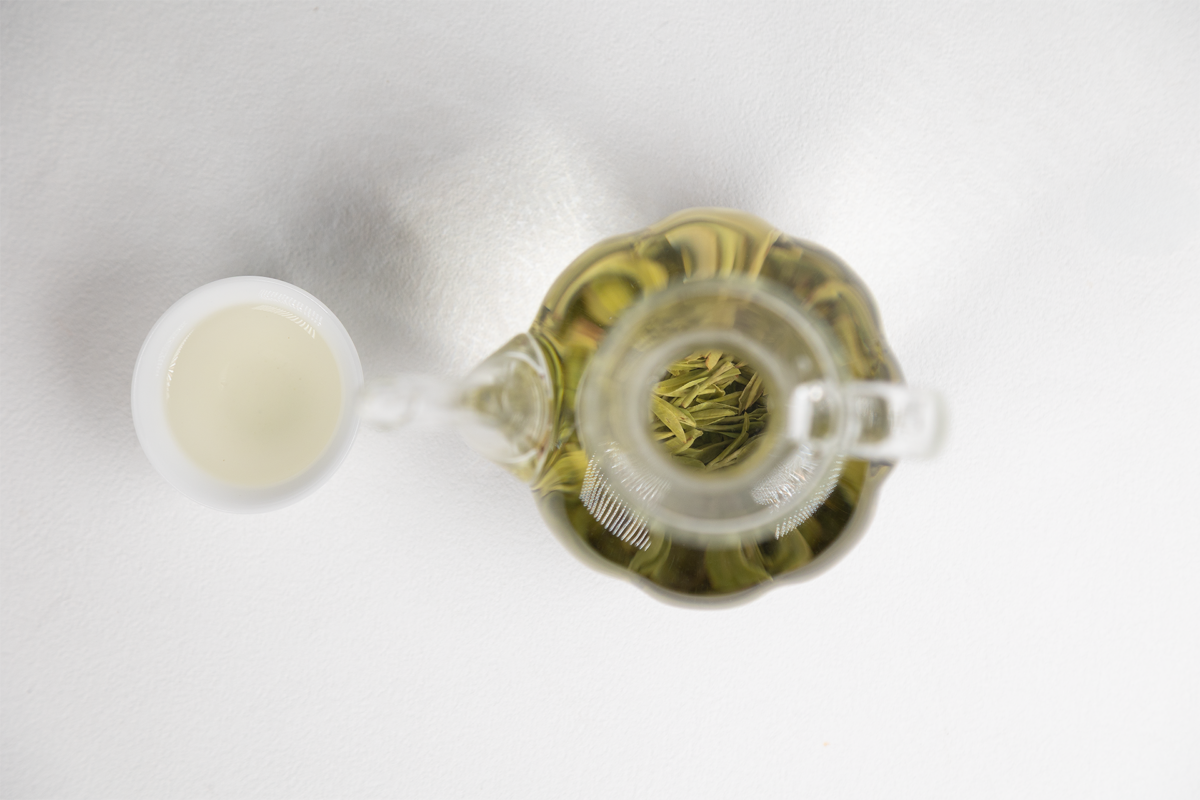
Green tea is the best tea for your skin. It has lots of catechins, especially EGCG, in each cup. EGCG is good for your skin in many ways.
It helps stop redness and spots. It also controls how much oil your skin makes. Green tea protects your skin from UV rays.
It helps keep wrinkles away. Studies say drinking green tea or using it on your skin can help. Your skin can get smoother and more stretchy. It can also be less hurt by the sun. One cup gives you 50-100 mg of EGCG.
This is enough to help your skin stay strong.
Tip: Drink green tea every day or use a green tea face mask for extra help.
You might want to know about black and white teas. White tea is made with the least steps. It keeps more catechins and polyphenols.
This means it has stronger antioxidants. White tea helps your skin heal.
It helps your skin make more collagen. It fights signs of getting older, like wrinkles and dark spots. It also helps calm red skin and helps fix your skin.
Black tea is made in a different way. It is fully fermented. This changes most catechins into theaflavins and thearubigins. These still help your skin, but not as much as green or white tea. Black tea can help your skin, but the effects are weaker.
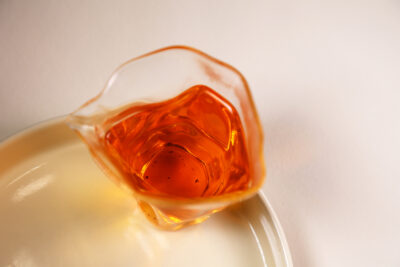 Tongmu Floral Fragrance Souchong
$25.00 – $62.00
Tongmu Floral Fragrance Souchong
$25.00 – $62.00
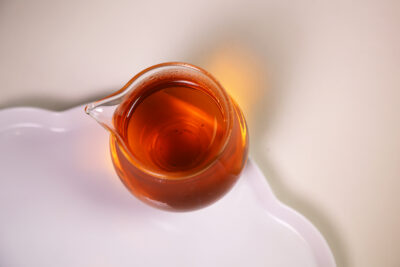 Da Hong Pao
Da Hong Pao Here is a quick table to compare:
Tea Type | Processing | Antioxidant Content | Skin Benefits |
|---|---|---|---|
Green Tea | Unfermented | Strongest protection, anti-ageing, anti-acne | |
White Tea | Least processed | Very high | Wound healing, collagen boost, anti-inflammatory |
Black Tea | Fully fermented | Lower | Mild antioxidant, some skin support |
Herbal teas can help your skin in many ways. Jasmine tea is often made with green tea. It gives you catechins and the calming power of jasmine flowers. Jasmine tea can help lower swelling and calm skin problems like acne. Other herbal teas, like lavender, rose, and chrysanthemum, can fight germs and swelling. These teas help stop bacteria that cause acne. They also help calm sore skin.
You can pick herbal teas if you want to try different things. Each herbal tea has its own polyphenols. This means the antioxidant power can change. Still, many herbal teas help your skin stay healthy. They help you control redness or spots.
Note: For the best Health Benefits, try different teas during the week. This way, you get more antioxidants and good things for your skin.
You can get the most out of your tea by brewing it the right way. Start with good quality loose leaf tea or whole herbs. This gives you more flavour and health benefits. Use the right water temperature for each type of tea:
Steep green and black teas for 2–3 minutes. Herbal teas need 5–7 minutes. You can reuse many herbal teas 2–3 times, just steep a bit longer each time. Avoid adding milk or sugar. These can block the good antioxidants from working in your body.
Tip: Use about one rounded teaspoon of dried tea leaves or herbs per cup. Adjust the amount and steeping time to suit your taste.
You might wonder how much tea you should drink for healthy skin. Studies show that drinking green tea every day can help your skin look and feel better. Here’s a quick guide:
Tea Type & Form | Daily Amount | Skin Benefits |
|---|---|---|
Green Tea (brewed) | 2–3 cups | Improves elasticity, hydration |
Green tea extract | 600 mg–1.4 g catechins | Boosts blood flow, reduces roughness |
Herbal teas | 1–2 cups | Calms skin, reduces inflammation |
If you have health conditions or are pregnant, check with your doctor before drinking large amounts of tea.
You can make tea part of your healthy lifestyle. Swap fizzy drinks or sugary juices for a cup of tea.
Set a regular tea break during your day to relax. Try adding tea to recipes, like smoothies or soups, for extra antioxidants.
Drinking tea helps your skin by fighting damage and lowering inflammation.
Teas like green, chamomile, and jasmine also help you relax and sleep better. When you combine tea with a balanced diet, good sleep, and regular exercise, you give your skin the best chance to stay healthy and age gracefully.
Note: Small changes, like choosing tea over less healthy drinks, can make a big difference for your skin and overall wellness.
You’ve seen how tea’s antioxidants help your skin stay healthy and youthful. By drinking tea each day, you support your skin’s repair and defence. Over time, tea polyphenols help slow cell ageing, protect your DNA, and keep your immune system strong. They even support your gut, which links to skin health.
Make tea a regular part of your routine. You’ll enjoy the Health Benefits now and for years to come. Your skin will thank you!
Want more wellness inspiration like this? Subscribe to our newsletter👇!
Yes, it can! Tea gives your skin antioxidants. These help fight damage from the sun and pollution. You may notice smoother, brighter skin if you drink tea often.
You might see small changes in a few weeks. Your skin could feel softer and look fresher. For bigger results, keep drinking tea every day for a few months.
You get the best results when you do both. Drink tea for inside support. Use tea-based creams or masks for extra help on the outside.
Tip: Try a green tea face mask once a week for a quick boost!
Yes, you can. Too much tea may upset your stomach or make you feel jittery. Stick to 2–4 cups a day. If you have health problems, ask your doctor first.
Want to know how tea compares to coffee?
Read our Caffeine Comparison Blog:
https://teaviews-e.com/tea-vs-coffee-a-caffeine-love-story-how-to-boost-energy-without-losing-sleep/